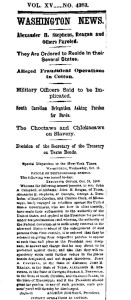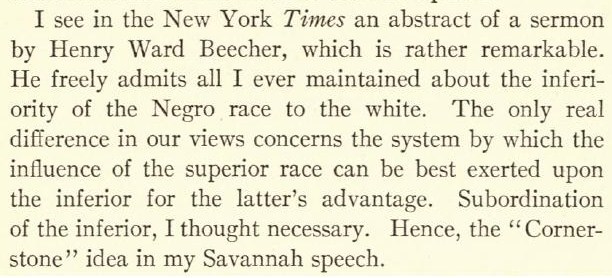but confined to Georgia
On March 21, 1861 new Confederate Vice President Alexander H. Stephens delivered his well-known Cornerstone Speech in which he praised the Confederate Constitution and maintained that the new government was based on racial inequality:Our new government is founded upon exactly the opposite idea; its foundations are laid, its cornerstone rests, upon the great truth that the negro is not equal to the white man; that slavery subordination to the superior race is his natural and normal condition. This, our new government, is the first, in the history of the world, based upon this great physical, philosophical, and moral truth. This truth has been slow in the process of its development, like all other truths in the various departments of science.
After four years of Civil War, Mr. Stephens was arrested at his home in Georgia on May 11, 1865 and imprisoned in Fort Warren from May 27th. 150 years ago today President Andrew Johnson paroled him and other ex-Confederates, including Postmaster General John H. Reagan after they submitted to United States’ authority.
From A Compilation of the Messages and Papers of the Presidents, by James D. Richardson:
EXECUTIVE OFFICE, October 11, 1865.
Whereas the following-named persons, to wit, John A. Campbell, of Alabama; John H. Reagan, of Texas; Alexander H. Stephens, of Georgia; George A. Trenholm, of South Carolina, and Charles Clark, of Mississippi, lately engaged in rebellion against the United States Government, who are now in close custody, have made their submission to the authority of the United States and applied to the President for pardon under his proclamation; and
Whereas the authority of the Federal Government is sufficiently restored in the aforesaid States to admit of the enlargement of said persons from close custody:
It is ordered, That they be released on giving their respective paroles to appear at such time and place as the President may designate to answer any charge that he may direct to be preferred against them, and also that they will respectively abide until further orders in the places herein designated, and not depart therefrom, to wit:
John A. Campbell, in the State of Alabama; John H. Reagan, in the State of Texas; Alexander H. Stephens, in the State of Georgia; George A. Trenholm, in the State of South Carolina; and Charles Clark, in the State of Mississippi. And if the President should grant his pardon to any of said persons, such person’s parole will be thereby discharged.
ANDREW JOHNSON,
President.
According to his prison diary (edited by Myrta Lockett Avary; September 1865 from page 500) during September 1865 Alexander H. Stephens wrote President Johnson about a possible meeting and wrote to Ulysses Grant asking that the general exert his influence to get him released on parole or on bail. On September 20th Mr. Stephens wrote to Secretary of State Seward that it was ridiculous that he was being kept locked up because as CSA Vice President he was a threat until all rebel states had been restored. On September 26th Mr Stephens read an abstract of a Henry Ward Beecher sermon in The New-York Times and was surprised that the abolitionist preacher shared his own views on white superiority:

![[Alexander Hamilton Stephens, half-length studio portrait, sitting] / John Goldin & Co. photographers. (between 1860 and 1870); LOC: http://www.loc.gov/item/2009634258/)](https://www.bluegrayreview.com/wp-content/uploads/2015/10/23894v-183x300.jpg)

